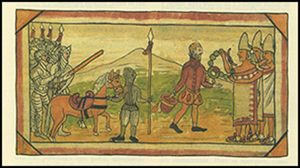Published online by Cambridge University Press: 13 July 2022

Campeche, one of the Spanish Empire's main Mexican ports, was a place where previously distinct cultures and populations intermingled during the colonial era (AD 1540–1680). Investigation of the town's central plaza revealed a Hispanic cemetery of multi-ethnic burials. The authors combine previous analyses with newly generated genome-wide data from 10 individuals to trace detailed life histories of the mostly young, local Indigenous Americans and first-generation European and African immigrants, none of whom show evidence of genetic admixture. These results provide insights into the individual lives and social divides of the town's founder communities and demonstrate how ancient DNA analyses can contribute to understanding early colonial encounters.
Jakob Sedig and Vera Tiesler contributed equally to this article